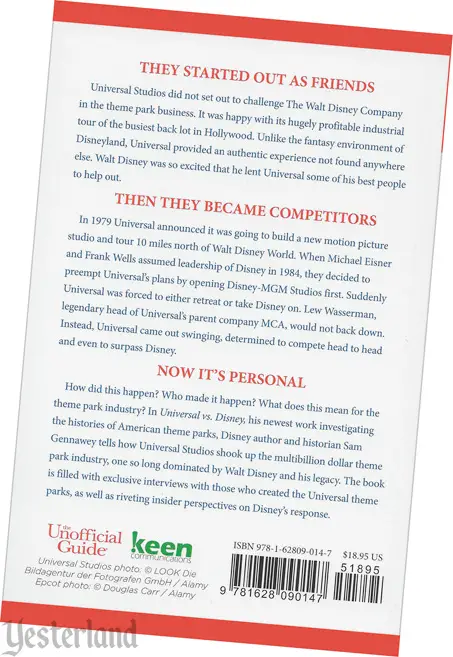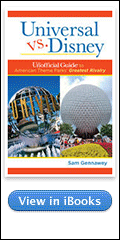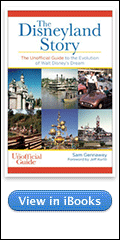|
|||||
|
|||||
|
Author Sam Gennawey is a friend and a fellow member of the MiceChat family. I wrote the foreword to his first book, Walt and the Promise of Progress City. But I promise you that this is an honest review. Last year, Sam told me he was working on a book about how Universal’s theme park business grew from a modest industrial tour into a theme park powerhouse. Finally, there would be a book about Universal! There have been many books about Disney theme park history and design (including Sam’s own excellent The Disneyland Story. But the only books about Universal had been travel guides. |
|||||

© Universal City Studios, Inc. Image from a 1972 Universal Studios Tour brochure |
|||||
|
Later, I was surprised to learn the book would be called Universal vs. Disney. Did that mean it would be about both companies? Now that I’ve read it, I can tell you that the answer is, “not really.” Think of it as Universal vs. Disney. |
|||||
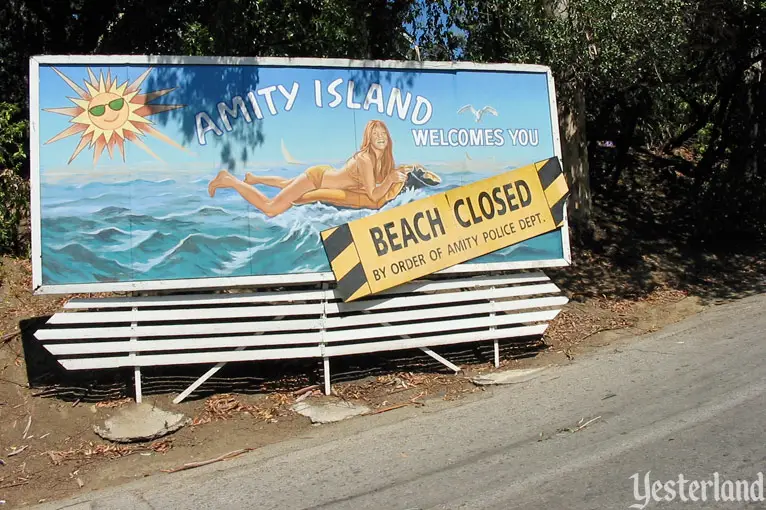
Photo by Werner Weiss, 2006 Amity (Jaws) billboard along the Studio Tour (tram tour) at Universal Studios Hollywood |
|||||
|
The book is primarily about the growth of Universal and the people who made it happen. Gennawey provides details about the amazing (and some not-so-amazing) shows and attractions that came and went over the years—not only from a guest perspective, but also looking “behind the scenes” at the creative process, technology, and business drivers. The book is not without Disney. Ever since the modern Universal Studios Tour launched in 1964, Disney has always been in the picture—as the company that set the standard for what theme parks can be, as a direct competitor, as a source of design talent, and as a challenge to the egos of Universal executives (who would repeatedly want to “out-Disney Disney”). The battle became especially fierce when both companies set out to build movie studio theme parks in Central Florida—with Disney’s plans looking suspiciously like plans that Universal had purportedly shared with Michael Eisner when he was with Paramount. There’s also the contrast between the corporate culture and leadership style at Universal compared to Disney. |
|||||
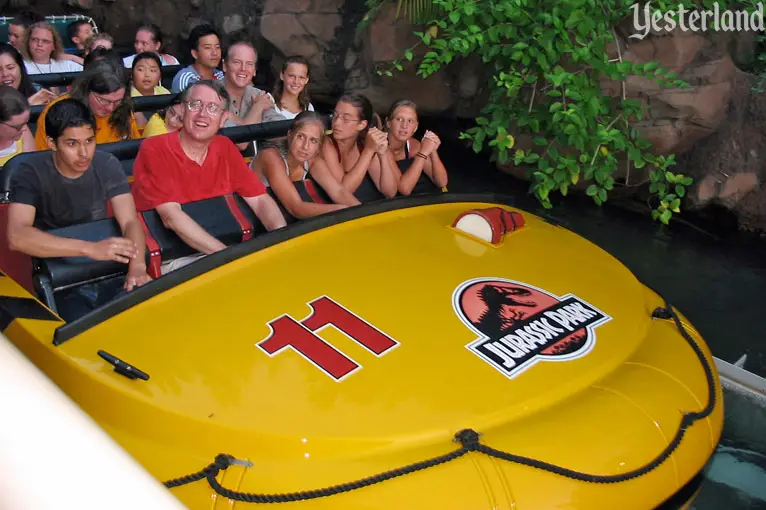
Photo by Karen Weiss, 2006 Jurassic Park — The Ride at Universal Studios Hollywood |
|||||
|
Let’s take a quick look at what Gennawey’s new book is and is not. The book is about Universal Hollywood and Universal Orlando. If you’re hoping to read about Universal-licensed parks in Asia (Universal Studios Japan and Universal Studios Singapore) or Universal’s ownership of PortAventura in Spain from 1997 to 2004, this is not the right book. Also, this is not a picture book. The only two pictures are on the front cover. The paperback has 264 pages, including the front matter, endnotes for each chapter, and an index. The text is small, so it’s packed with content. |
|||||

Photo by Werner Weiss, 2012 Entrance to Universal Studios Florida |
|||||
|
Although it’s packed with details, the book never gets bogged down in them. Befitting its subject, an entertainment company, the book is entertaining. It’s fun to learn about attractions that were never built, to read descriptions of long-gone features of the Hollywood and Orlando parks, and discover things you never knew about Universal. |
|||||

Photo by Werner Weiss, 2009 Looking across the lagoon at Universal’s Islands of Adventure |
|||||
|
One of my favorite parts was a detailed description of Cartoon World, an early concept for a second park in Orlando. Based primarily on interviews with people who were part of an eight-person brainstorming team, Gennawey describes the lands and attractions they dreamt up. A Superhero Land based on DC Comics would have The Joker’s Madhouse (“part haunted house, part insane asylum, and part carnival of the weird”). Warner’s Looney Toons Land would include the Coyote Canyon Roller Coaster featuring Wile E. Coyote and the Roadrunner. The World of Doctor Seuss would bring the stories and settings from the imaginative children’s books into a theme park for the first time. Several pages of details about Cartoon World allow you to imagine what it would have been like to visit. |
|||||
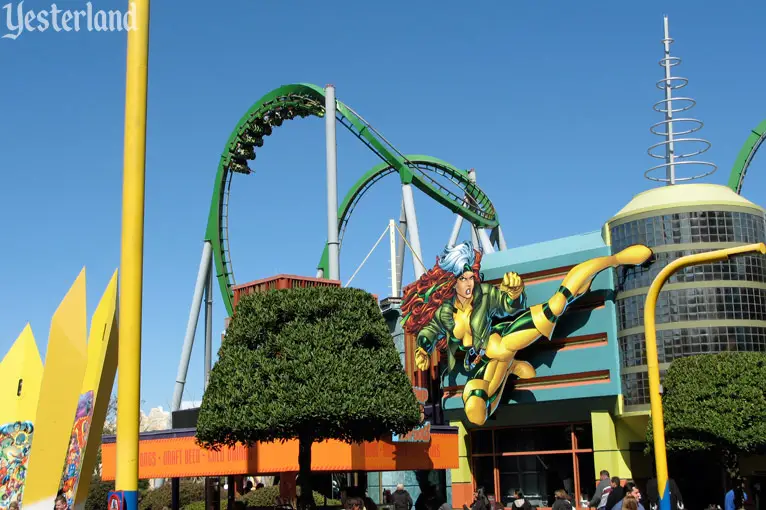
Photo by Werner Weiss, 2009 Marvel Super Hero Island at Universal’s Islands of Adventure |
|||||
|
Although almost nothing envisioned for Cartoon World ever became reality, Cartoon World set the stage for Universal’s Islands of Adventure, including Seuss Landing. |
|||||

Photo by Werner Weiss, 2011 Wizarding World of Harry Potter at Universal’s Islands of Adventure |
|||||
|
This book is a must-read for anyone who enjoys taking a closer look at theme parks and themed entertainment. I thoroughly enjoyed it. |
|||||
|
About the Author |
|||||

Author Sam Gennawey |
|||||
|
Sam Gennawey is the author of the history of Walt Disney's first ever destination attraction, The Disneyland Story. Gennaway is also the author of Walt and the Promise of Progress City, a contributor to Planning Los Angeles and other books, and a columnist for the popular MiceChat website. His unique point of view built on his passion for history, his professional training as an urban planner, and his obsession with theme parks has brought speaking invitations from Walt Disney Imagineering, the Walt Disney Family Museum, Disney Creative, the American Planning Association, the California Preservation Foundation, the California League of Cities, and many Disneyana clubs, libraries, and podcasts. He is a senior associate at the planning firm of Katherine Padilla and Associates, and he lives in Los Angeles. |
|||||
|
Where to Buy the Book Universal vs. Disney: The Unofficial Guide to American Theme Parks’ Greatest Rivalry is available from Amazon, other online booksellers, and many book stores. Also consider The Disneyland Story (Yesterland review) by Sam Gennawey (foreword by Jeff Kurtti) and Walt and the Promise of Progress City (foreword at Yesterland) by Sam Gennawey (foreword by Werner Weiss). Please use the links below. |
|||||
|
|||||
|
|||||
|
|
|||||
|
|
|||||
© 2014-2015 Werner Weiss — Disclaimers, Copyright, and Trademarks Updated April 17, 2015.
Disclosure per FTC guidelines: Werner Weiss received a review copy of Universal vs. Disney: The Unofficial Guide to American Theme Parks’ Greatest Rivalry. Mr. Weiss does not receive any financial consideration from Sam Gennawey or Unofficial Guides, published by Keen Communications.
|
|||||

